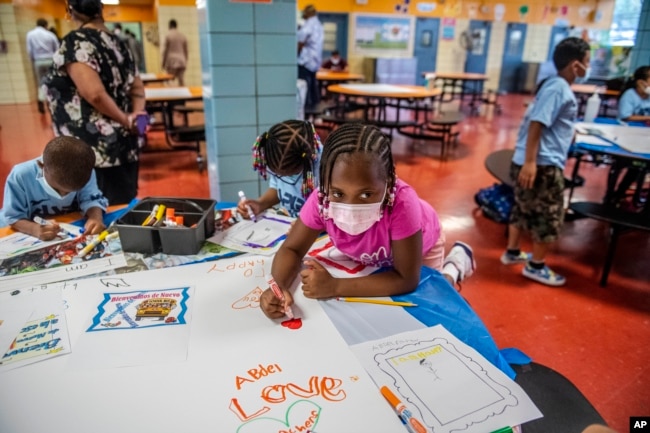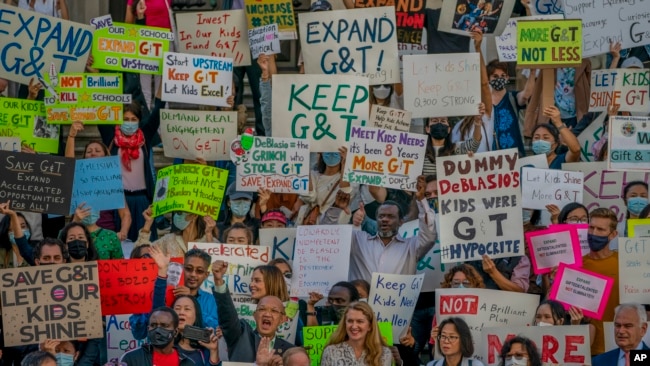学校教育における英才教育
やっぱりアメリカ、英才教育プログラム!!
と思ったのですが、そこはやはりアメリカ、人種差別の根強さが加わって複雑な問題を抱えているようです。
日本でも、どんどん飛び級とか英才教育取り入れたらいいんじゃないかと個人的には思っています。
一方、最近話題になる非認知能力。
IQやテストや偏差値のような数値化できる認知能力ではなく、“社会性” “共感力”“自制心”や“問題解決能力” “計画性” “柔軟性” など、従来の学力とは異なる数値化できない個人の能力のことです。
米国だけではなくシンガポールやインドネシアなどアジア諸国も、現在この力を伸ばすプログラム「ソーシャル・エモーショナル・ラーニング」に特に力を入れていると読んだことがあります。
教育とは、個人的な利益を追求するためのものではなく、社会にとって有益な人物に育てられるかどうかで、国家として大切なことだと思います。
IQと非認知能力、どちらも重要ですよね〜!!
さて、今回のVOA、talented segregation diverse mentality exclusive などカタカナ言葉で使っている単語が結構あります。本来の意味とずれている使い方をしないよう、要チェックですね。
好きなものだけ、またはビジネス英語だけではないのがニュースを伝える番組の最大の良さです。単語、表現習得にもってこい!!
VOAニュースはスクリプト付きですし、このPC版は読むスピードがゆっくりですがアプリでは速度調整ができるのが気に入っています。
Let't begin!!!
アメリカの学校では英才教育について議論されている (和訳)
US Schools Debate Gifted and Talented Programs
アメリカの学校には、優秀な生徒を対象とした才能開発プログラムがあります。
このようなプログラムは、近年、批判の対象となっています。保護者の中には、このプログラムが、アメリカの教育システムにおけるracial segregation 人種的分離とinequities不公平感を悪化させていると言う人もいます。
10月初旬、ニューヨーク市長は、全米最大の教育システムであるニューヨーク市の英才教育プログラムを廃止する計画を発表しました。この計画が実行されれば、マサチューセッツ州ボストンからワシントン州シアトルまで、同様のプログラムの廃止を支持するグループにとって大きな勝利となります。
米国の公立学校では、英才教育は当初から、不平等な教育システムを生み出すものとして懸念されていました。多くのプログラムは、racially diverse人種的に多様な都市部の公立学校から白人家庭が撤退しないようにするために始まったものです。これらのプログラムは、成績の良い私立学校に対抗するために作られたものです。
学校の指導者や保護者は、公平性をめぐる難しい問題にますます対処しなければならなくなっています。彼らは、他の生徒の成功を支援しながら、強い学習者を教える方法を見つけようとしています。この問題は、英才教育プログラムを拡大するか、完全に廃止するかという議論の原動力となっています。
「燃やしてしまう、壊してしまうという考え方はわかりますが、その代わりに何をすればいいのでしょうか」とMarcia Gentryマーシャ・ジェントリー氏は問いかけます。マーシャ・ジェントリー氏は、インディアナ州にあるパデュー大学の教育学教授であり、英才教育研究資料研究所の所長です。
ジェントリー氏は、2年前に、英才教育プログラムにおける人種間の不平等についての研究を共同執筆しました。
この研究によると、米国の学校では330万人の生徒が才能ある生徒として認定されています。しかし、さらに360万人の才能ある生徒がプログラムに組み込まれていませんでした。これらの生徒は、黒人、ラテンアメリカ人、ネイティブアメリカンに偏っていることがわかりました。

FILE — In this Aug. 17, 2021 file photo, students write and draw positive affirmations on poster board at P.S. 5 Port Morris, an elementary school in The Bronx borough of New York. New York City wants to phase out its program for gifted and talented studentsFILE - 2021年8月17日、ニューヨークのブロンクス地区にある小学校、P.S.5ポートモリスで、生徒たちがポスターボードに肯定的な言葉を書いたり、描いたりしている写真。ニューヨーク市は、才能のある生徒のためのプログラムを段階的に廃止したいと考えています。
Associated Press AP通信が連邦政府の最新データを調査したところ、全国の公立学校では、白人の8.1%、アジア系アメリカ人の12.7%の子供たちが才能があると考えられていることがわかりました。しかし、ヒスパニック系の生徒の4.5%、黒人の生徒の3.5%しか才能があると認められていません。
英才プログラムは、通常のプログラムでは限界を感じる生徒に、より厳しい指導を行うことを目的としています。このプログラムを廃止しようとする動きには、優秀な生徒を罰することになるという批判もあります。また、特に私立学校に通う手段のない貧しい家庭の生徒にとっては、上に上がるチャンスを失うことになるとも言います。
シアトルでは、学校制度の元幹部が英才教育プログラムの廃止を試みました。彼女はこのプログラムが学校分離を悪化させていると非難しました。シアトルの公立学校が最近行った調査によると、黒人の子供で才能があると認められたのは0.9%に過ぎず、白人の生徒では12.6%に過ぎませんでした。
その後、学校の指導者たちは、このプログラムの変更を承認しました。生徒は成績に基づいて入学が許可されます。このプログラムに参加するためにテストを受ける必要はなくなりました。選考委員会は、教師、家族、コミュニティのメンバーからの意見も考慮します。
Rita Greenリタ・グリーンさんは、人種的正義の団体である地元のNAACPの事務所で働いています。彼女は、今回の変更は十分ではないと言います。彼女は、学校が、最も成功した生徒だけでなく、市の5万人の生徒全員を支援することを望んでいました。
「私たちは、このプログラムを廃止したいのです」とグリーンさんは言います。また、このプログラムは”本質的に人種差別的”であるとも述べています。
ミネアポリスのジョージ・フロイド君が殺害されて以来、米国内の他の学校でも英才教育プログラムを見直す動きが出ています。
ボストンの学校は、そのプログラムを拡大し、市内の貧しい地域の優秀な生徒の入学を保証することを決議しました。カリフォルニア州サンフランシスコのトップ高校は、入学試験を廃止しました。バージニア州のフェアファックスにあるトップ高校では、最近、保護者が試験の存続を求めて訴訟を起こし、敗訴しました。
ほとんどの英才教育プログラムでは、テストの点数で入学者を決めています。裕福な家庭では、子供のスコアを上げるための指導に何千ドルも費やすことができます。
ニューヨークほど議論が白熱しているところはありません。Bill de Blasioビル・デ・ブラシオ市長は先月、このプログラムを“exclusionary””排除的”と称して廃止に着手すると述べました。
次期市長と目されるEric Adamsエリック・アダムス氏は、このプログラムの廃止には賛成しないと述べています。
しかし、パデュー大学の研究者であるGentry,ジェントリー氏は、英才教育プログラムの公平性の問題を解決する時期に来ているということに同意しました。彼女は、保護者と学校関係者に、妥協点を見つけるための大変な作業をするよう促しました。
ジェントリー氏は「不公平さが存在することはわかっています。」「簡単な解決策がやめることということに憂慮しています。」と述べています。
American school systems usually have gifted and talented programs for students that show a high level of success.
Such programs have been under much criticism in recent years. Some parents say they worsen racial segregation and inequities in the country’s education system.
In early October, the mayor of New York City announced plans to end the gifted and talented programs in the country’s largest school system. If it goes forward, that would be a big win for groups supporting an end to similar programs from Boston, Massachusetts, to Seattle, Washington.
From the start, gifted and talented school programs drew worries they would produce an unequal education system in U.S. public schools. Many programs began as efforts to keep white families from leaving racially diverse public schools in urban areas. They were created to compete with high-performing private schools.
School leaders and parents increasingly have to deal with difficult questions over equity. They are trying to find ways to teach strong learners while continuing to help other students succeed. It is a question that is driving the debate over whether to grow gifted and talented programs or end them completely.
“I get the burn-it-down and tear-it-down mentality, but what do we replace it with?” asked Marcia Gentry. She is a professor of education and the director of the Gifted Education Research and Resource Institute at Purdue University in Indiana.
Gentry co-wrote a study two years ago that followed the racial inequities in gifted and talented programs.
The study found that U.S. schools identified 3.3 million students as gifted and talented. But an additional 3.6 million who should have also been considered gifted were not included in the programs. The study found these students were disproportionately Black, Latino and Native American.
An Associated Press study of recent federal data found that nationwide, 8.1 percent of white and 12.7 percent of Asian American children in public schools are considered gifted. But only 4.5 percent of Hispanic and 3.5 percent of Black students are identified as gifted.
Gifted and talented programs aim to provide more demanding instruction for students who feel limited with the regular program. Critics of the push to end them say it punishes successful students. They say it also cuts off a chance for students to move up, especially for those from poor families without the means to attend private schools.
In Seattle, a former top official of the school system tried to end its gifted and talented program. She blamed it for worsening school segregation. In its own recent study, Seattle public schools found only 0.9 percent of Black children had been identified as gifted, compared with 12.6 percent of its white students.
School leaders have since approved changes to the program. Students will be admitted based on their performance. They are no longer required to take a test to enter the program. The selection committee will also consider input from teachers, family and community members.
Rita Green works for the local NAACP office, a racial justice organization. She said the changes do not go far enough. She wanted the schools to help all of the city’s 50,000 students, not just the most successful.
“We want the program just abolished,” Green said. She added that the program is “inherently racist.”
Since the killing of George Floyd in Minneapolis, other school systems around the U.S. are also rethinking their gifted and talented programs.
Boston schools voted to expand its program and guarantee placements for top students from poorer areas of the city. A top high school in San Francisco, California removed its entrance exam. As did a top high school in Fairfax, Virginia, where parents recently lost a legal fight to keep the test.
Most gifted and talented programs have used test scores to decide which students to admit. Some wealthier families are able to spend thousands of dollars on instruction to increase their child’s scores.
Nowhere has the debate been as heated as in New York City. Mayor Bill de Blasio said last month that he would begin to end the program, calling it “exclusionary.”
Eric Adams, likely the city’s next mayor, said he does not support ending the program.
But Gentry, the Purdue researcher, agreed that it was time to fix the equity problems of gifted and talented programs. She urged parents and school officials to do the hard work of finding a compromise.
“I know the inequities exist,” Gentry said. “I worry that the easy solution is to stop doing it.”
Words in This Story
talented — adj. having a special ability to do something well
segregation — n. the practice or policy of keeping people of different races, religions, etc., separate from each other
inequity — n. lack of fairness : unfair treatment
diverse — adj. made up of people or things that are different from each other
mentality — n. a particular way of thinking
disproportionate — adj. having or showing a difference that is not fair, reasonable, or expected : too large or too small in relation to something
abolish — v. to officially end or stop (something, such as a law) : to completely do away with (something)
inherent — adj. belonging to the basic nature of someone or something
score — n. the number of points that someone gets for correct answers on a test, exam, etc.
exclusive — adj. available to only one person or group
日本における飛び入学
文部科学省によると、日本にも「飛び入学」という制度が設けられています。これは「学校教育法」で定められているもの。
しかし・・・
令和2年度入試における「飛び入学実施大学」は8大学のみ。
よほどの才能の持ち主でないと難しいそう。。。。。
